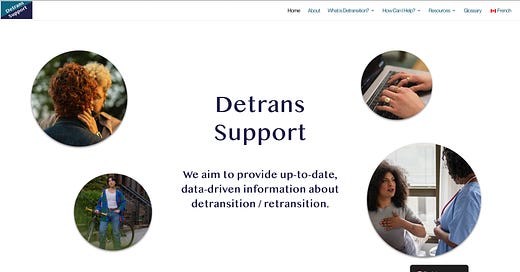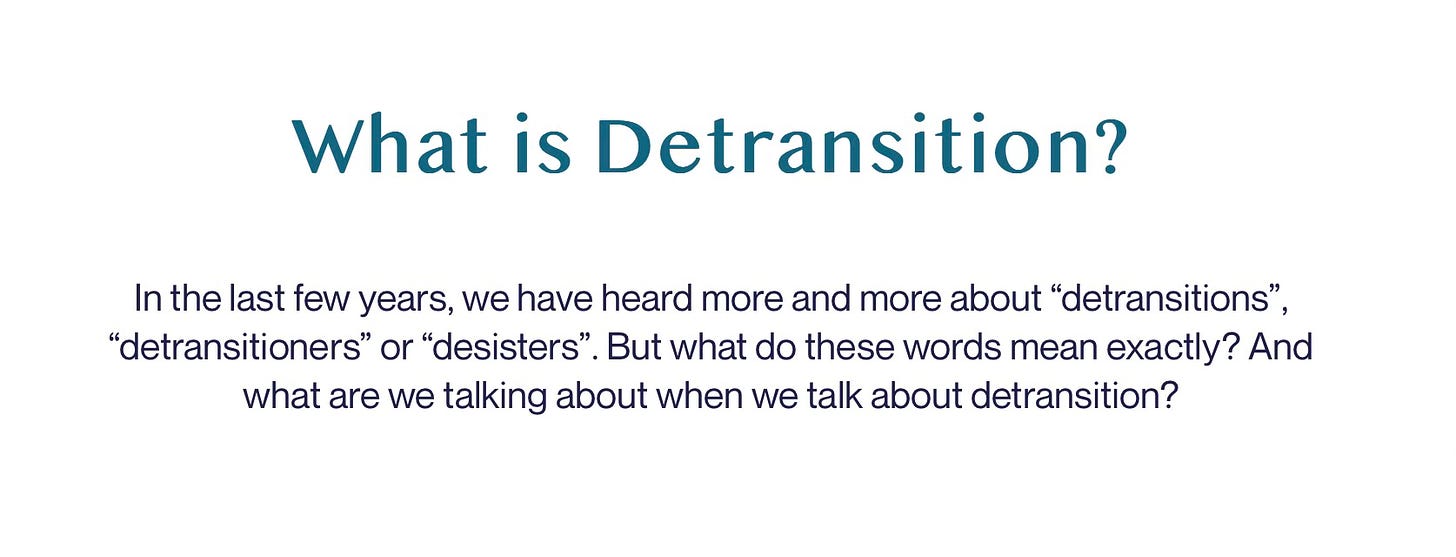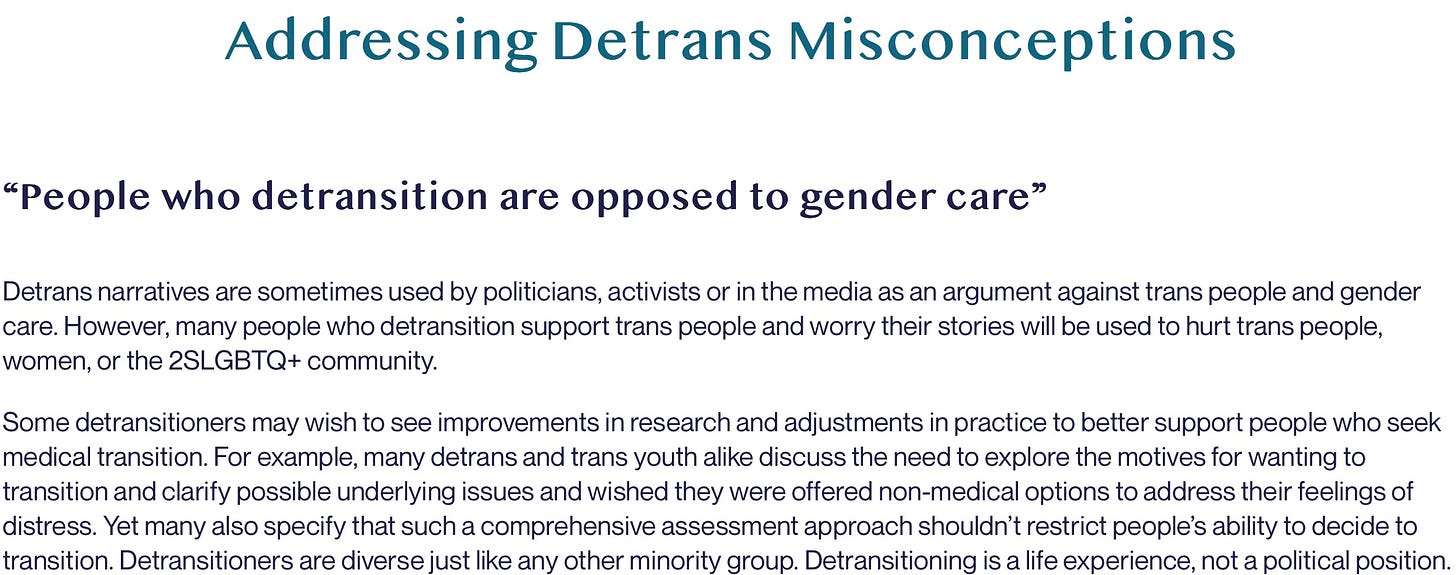Detrans Support: A research-based and community-driven resource
Detrans Support offers resources, information, and support, and it addresses common misunderstandings about detransition/retransition.
Common themes running through research studies about detransitioning/retransitioning is desiring more supports and a need for greater awareness and understanding.
Today’s writing is a presentation and summary of an online support/education resource: Detrans Support.
This resource was first launched about a year ago and its development was funded by the Social Sciences and Humanities Research Council (SSHRC).
Detrans Support: Bridging the care provider and community gaps
Although there is some informal peer support happening, such as on Reddit, TikTok, Discord, or informal Zoom meetups, there are very few, if any, formal supports. We are not aware of any LGBTQ2S+ organizations currently offering formal support groups for detransitioning. (Please correct us if this is inaccurate!)
This is disappointing, since research shows that detransition can often involve shifts in identity across the LGBTQ2S+ spectrum, such as moving from trans man to lesbian/queer, from binary trans to nonbinary, genderqueer, or gender fluid; from binary trans to two-spirit; or from trans woman to gay/bi. These shifts can also occur from trans to “cis-het”; however, these experiences seem to be a bit more in the minority, at least from available research studies.
Retransitioning can involve reconnecting with a trans or nonbinary identity after a temporary period of detransitioning. The current rates of detransition—and retransition following a detransition—are a bit uncertain.
But these patterns suggest that, for some people, LGBTQ2S+ identities can be fluid. Our self-understandings may evolve over time as we move through life.
Community supports are important to reduce isolation when people are questioning their initial transition, exploring feelings of grief or regret over changes made to the body, or are contemplating a social and/or medical detransition. It can be an uncertain decision.
Detrans Support aims to offer politically-neutral, research-driven information about detransition/retransition. It’s aimed at people who are questioning or detransitioning/retransitioning, as well as their friends, family, gender care providers, and anyone else who wants to learn about these experiences.
Also, it’s available in English and French!
The resource was developed from two research studies, both funded by the SSHRC: the Detrans Discourses study (led by Professor Annie Pullen Sansfaçon) and The Re/DeTrans Canada study (led by Kinnon MacKinnon). Combining data gained from these studies, as well as community consultations, the website provides data-driven education, information, and challenges common myths.
We’ve summarized a few highlights below, but you can check it out for yourself here.
What does it mean to detransition?
Detransition is still an emerging term. It does not have a consistent definition that is agreed upon by researchers, care providers, and communities.
So what does it mean and what does it entail? Detrans Support tries to answers this question on its “What is detransition?” page. Informed by current research, this page covers everything from definitions, to reasons, to processes.
Detransition describes an experience of stopping, shifting, or reversing a gender transition, usually because a person’s self-identity has changed since they first began transitioning.
Detransition can also involve stopping hormonal therapy, and it may also involve social changes, such as going back to one’s birth name, going with a new name, or sticking with the same name; and possibly changing pronouns, hairstyle, and clothing. For those who have had gonadectomies (removal of the ovaries or testes), exogenous hormone therapy may be needed, so switching hormonal therapies can sometimes be involved.
For others, detransition might be more of an internal shift in self-perception, re-affirming one’s sex/gender from childhood, or perhaps questioning the initial gender transition, but not necessarily taking any new social/medical steps.
It’s often not possible to reverse all steps of a gender transition. For instance, surgeries and some effects of hormones are irreversible. In such cases, the effects of medical/surgical interventions may have a permanent impact on a person’s life and the way one moves around in the world, interacts with the healthcare system, in romantic/sexual relations, and in broader society.
This is why it is not quite realistic to say that detransition equals a reversal of transition, or to suggest that detrans people were “never really trans.”
Some have interpreted the de in “detrans” from its latin root, meaning “of” or “from.” From this perspective, “detrans” would mean “of trans origins.”
Yes, it’s a bit esoteric and navel-gazy, but we are academics who overthink everything. Sorry! (It was Kinnon who came up with that one.)
Like transition, detransition experiences can take a variety of forms. Current research has found that people detransition for many reasons, including both internal (e.g., dissatisfaction with transition outcomes, changes in gender identity or sexual orientation identity, or medical complications) and external factors (e.g., social pressure or minority stressors). Often, research participants report multiple reasons to detransition.
Myths about detransition
Perhaps because detransition has become such a politically charged topic that is also a “culture war” issue, there are many myths and misconceptions floating around that are not necessarily supported by research.
Detrans Support has a page dedicated to addressing these misunderstandings with a nuanced, data-driven and community consultation approach.
Let's look at a few of those myths.
“People who detransition are opposed to gender care”
Detransition is an emerging socio-medial phenomenon and it describes a life experience. There is no default political perspective affiliated with detransitioning. In reality, people who detransition have a range of beliefs like any other minority group.
While some detransitioners may advocate for changes in health care provision for gender diverse people, and some do advocate for total bans on gender-affirming healthcare, overall, most detrans/retrans people simply want a high-quality healthcare system and good research to support decision-making.
“People who detransition are not part of the LGBTQ2S+ community/they are just cisgender”
People who detransition can have a wide range of identities, gender expressions, and sexual orientations, including cis, trans, nonbinary, genderqueer, genderfluid, butch, and gender nonconforming. Additionally, many detransitioners are gay, lesbian, bisexual, two-spirit, or queer.
Furthermore, some may philosophically reject the concepts of “cis” and “trans” entirely and opt out of the cis/trans binary system of classification.
When this shift in self-identity or beliefs about gender occurs, we have seen individuals either adopt a nonbinary identity or beliefs that are more aligned with gender critical or radical feminist ideas.
So no, detrans people are not “just cisgender.”
“Everyone who detransitions regrets their transition”
Some people who detransition do regret their transition, highlighting a need for more research and supports.
However, this is not true for everyone. Many detransitioners express complicated feelings of both regret and satisfaction, or even ambivalence about their gender transitions. Others who detransition are satisfied with their decisions and/or the medical changes they have made. Rates of regret in current studies of detransition experiences vary.
“Life is ruined after a detransition”
Detransition can come with complex and distressing feelings like anger, grief, and regret. Along with those can come worries about the future and feelings of helplessness. Likewise, people who detransition may find they still have mental health needs or feelings of dysphoria that need to be addressed.
Despite this, many detransitioners are resilient and report leading fulfilling lives, and even finding some positives—learning to find internal validation, for instance. Many express the benefits of community support in working through challenging feelings.
“People detransition because of transphobia”
As with regret, this can be accurate. Some people detransition due to transphobia and gender minority stressors, and some might later retransition, while others will not.
However, it’s important to note that people do not detransition for any one single reason, and research has found that, despite common belief, transphobia or lack of support is not necessarily the main motivator for detransition. Mental health related factors, shifts in self-understanding, and complications with hormones/surgeries tend to be commonly reported reasons for detransition.
“I can’t stop my transition, or detransition, I’ve invested so much” (a.k.a. “the sunk cost fallacy”)
It’s true that detransition can be a difficult process, potentially involving difficulties being perceived authentically, worrying about social rejection, or worrying that unaffirming people may say “I told you so.” Having to let go of something after investing a lot of time in it can be hard. Despite this, it’s always possible to move forward.
Regret
Detrans Support offers a worksheet about regret. Although not all people who detransition experience regret, some do.
This worksheet first takes a cognitive behavioural approach to managing regret and griefs, with suggestions for identifying and examining feelings surrounding regret. This includes potential ways to manage feelings of regret, grief, anger, and frustration about transition experiences.
The regret worksheet also explores an embodiment approach to managing regret, focusing on experiencing pleasure and positive feelings in one’s body. The worksheet offers many suggestions, such as relaxation techniques and engaging in enjoyable activities.
In an ideal world, if someone is experiencing significant grief, regrets, and distress relating to their transition, and the detransition process, they would be able to access formal supports. For instance, a support group offered by an LGBTQ2S+ organization, services from the gender care provider who initiated the process, and/or publicly accessible psychotherapist who can work with trauma and grief. As we mentioned, though, these services range from non-existent to hard to access. This is why, as researchers, we have already prioritized giving presentations to, and having many meetings with, gender care providers as well as LGBTQ2S+ organizations.
We hope that more formalized recognition and support systems are eventually put into place.
And in the meantime, we hope that the Detrans Support website can offer a little bit of help.
Thank you for reading The One Percent!
If you enjoyed this post, please share it with your friends, family, or colleagues:
You can also subscribe for free to receive new posts and support our work:









“In an ideal world, if someone is experiencing significant grief, regrets, and distress relating to detransition, they would be able to access formal supports. For instance, a support group offered by an LGBTQ2S+ organization, services from the gender care provider who initiated the process,”
Nice word games you’re playing here.
First of all, the regret would be related to transition, not detransition.
And surely you already know that there is no support for detransition to be had from LGBT groups or from “gender care” providers. That’s part of the problem for detransitioners.
You are showing yourselves to be charlatans.